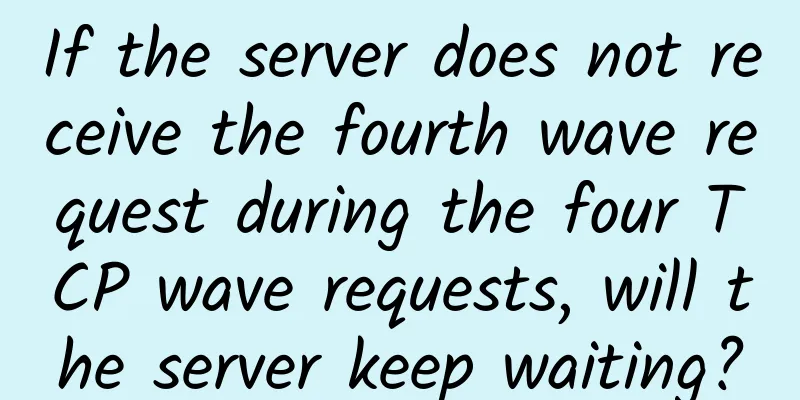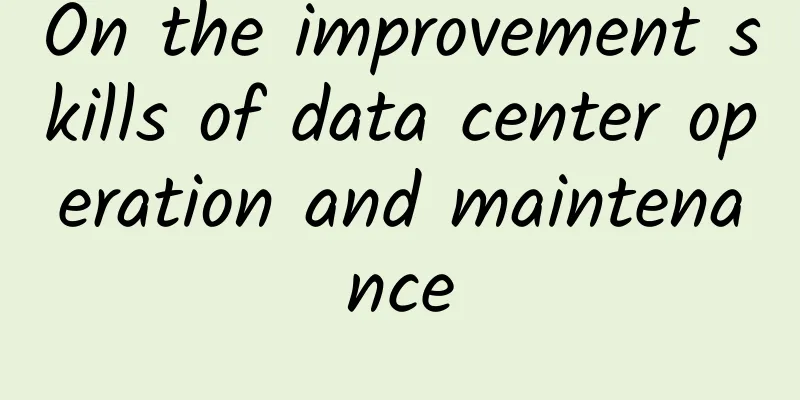If the server does not receive the fourth wave request during the four TCP wave requests, will the server keep waiting?

|
I'm going to copy an answer from a certain website and write an article about it. TCP four times wave Under normal circumstances, as long as the data transmission is completed, both the client and the server can actively initiate four waves to release the connection. Just like the picture above, assuming that the four waves are initiated by the client, it is the active party. The server passively receives the client's wave request and is called the passive party. Both the client and the server are initially in the ESTABLISHED state.
The above mentioned is that the active party no longer sends data. But if the passive party still has data to send at this time, then continue to send it. Note that although the passive party can send data to the active party between the second and third wave, it is not certain whether the active party can receive it normally. This will be discussed later.
The first and third waves are actively triggered by us in the application (such as calling the close() method), which is what we need to pay attention to when writing code. The second and fourth waves are automatically completed by the kernel protocol stack. We don't touch this part when writing code, so we don't need to worry too much. In addition, whether active or passive, each party sends a FIN and an ACK. It also receives a FIN and an ACK. Back to the main question. If the server does not receive the fourth wave request during the four TCP wave requests, will the server keep waiting?The fourth wave is triggered by the third wave. If the server does not receive the fourth wave, it will think that its third wave is lost, so the server keeps retrying to send the third wave (FIN). The number of retries is controlled by the system's tcp_orphan_retries parameter. If the server fails to retry many times, it will directly disconnect the connection. So the conclusion is that the server will not keep waiting for the fourth wave. TCP fourth wave lost # cat / proc / sys / net / ipv4 / tcp_orphan_retries In addition, you will find that the tcp_orphan_retries parameter is 0, but it does not mean no retries. When it is 0, the default value is 8, which means 8 retries. /* Calculate maximal number or retries on an orphaned socket. */ Of course, if the server retries to send the FIN for the third time, using the same port and IP, and a new client is started, the client will regard the retried FIN as an abnormal data packet after it is received, and will directly send a RST to the server, and the connection between the two ends will be disconnected. |
<<: One of the biggest features of 5G is the security minefield
>>: Why do base stations need to go to the sky?
Recommend
Cloudxtiny: £1.5/month KVM-512MB/5G SSD/100GB/UK data center
Cloudxtiny is a hosting company from the UK, prov...
What are the challenges of using multiple team collaboration apps?
Many companies are already using various team col...
SDN changes the development path of router technology
Over the past 30 years, IP networks with routers ...
Ruijie Smart Town E-Day Tour
[[254402]]...
The 400G era is coming, and new optical fibers may be the best partner
With the continuous emergence of high-definition ...
Let’s talk about 5G this year
Time is like quicksand, and the 2010s are about t...
Let's talk about the basic principles of common serial communication
Why do we need to talk about serial communication...
New plan of the three major operators to increase speed and reduce fees! Be sincere, but be careful of "small tricks"
In the past four years of the implementation of t...
2020 China Computer Education Conference: Building a University Computing Talent Ecosystem with an “Intelligent Base”
[51CTO.com original article] From December 18 to ...
TCP and UDP, 123 things you need to know (TCP)
Preface As a network operation and maintenance pe...
What is 5G voice like now?
In the 5G era, real-time communication is still a...
A national expert group visited Tiantan Hospital to discuss the smart transformation of hospitals in the digital era
On August 27, the "Entering Tiantan - Smart ...
5G development enters its fourth year, and innovation is the key to development
On June 6, 2019, the Ministry of Industry and Inf...
How can the chip industry survive in the era of the Internet of Things?
After the industrial revolution, the computer age...
Future careers will be completely new and different. What new and mind-blowing jobs will there be in 2018?
The arrival of the New Year is always exciting, e...









![[5.1]BGPTO: Japan server $64/month, E3-1230v3/16GB/480G SSD/20M Softbank line](/upload/images/67cabed27700f.webp)